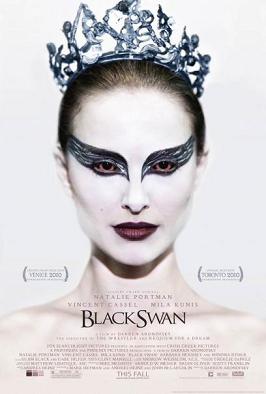
WHAT I DID FOR BALLET
The Criterion version of the classic 1953 musical The Band Wagon includes a brilliant lost dance number by Cyd Charisse called “Two-Faced Woman.” The lanky Texan with the French married name performs a delirious routine in a sleek black outfit. For all the Technicolor appeal, the outtakes reveal something you don’t expect. You get to see Charisse screw up. There are moments in the creation of all that magic when her body (and her five-inch heels) let her down.
Charisse could dance as the elegant priss, the prim damsel fantasy. But ask her to play a devilish seductress and she would cut loose, a beauty fully aware of her beauty and confident in her sexuality. Watching Charisse dance isn’t just watching someone execute steps. It’s to assume she is good in bed.
This duality is the torment of Nina, played by a resurgent Natalie Portman, in Darren Aronofsky’s erotic ballet psychodrama Black Swan. She has plenty of the steps but none of the seduction. She’s the sort of young woman still asked if she is a virgin. Even at 28, she lives in a pink room, locked inside her overbearing mother’s creepy cryogenic-esque chamber of adolescence. Her window sill has fluffy stuffed animals serving as prison guards to prevent her escape.
As her ballet troupe casts Swan Lake, the gifted, fragile dancer is seen as a natural for the lead role of the angelic White Swan. But to get the role, can she also dance the seductive Black Swan? The head of the dance troupe (a sharp Vincent Cassel) isn’t so sure. What he needs is for her to seduce the audience like the naturally flirtatious new dancer, Lily (Mila Kunis). He needs Nina to lose herself in the performance. But losing yourself sometimes means just that – losing yourself.
From the category of fortunate accidents, I recently viewed Roman Polanski’s Repulsion. For all the clear references to The Red Shoes and All About Eve, Repulsion and Black Swan seem like companion pieces that share several elements – a frail female sinking into paranoid fantasy, a libidinous sister figure, and even a freaky-gory scene with fingernails and oozing blood (eek!). Both films have the same basic purpose – to re-cast a woman’s paranoid inner life and frosty sexuality as a horror story.
 This brand of film always leads me to ask (suspiciously): are these insights recognizable (if not necessarily realistic) to women? Or is this the received wisdom of men about women, derived from movie formula rather than insight? It’s possible that I lost the authority to answer this question nine months before my birth, when I lost the grand zygote lottery in the birth canal.
This brand of film always leads me to ask (suspiciously): are these insights recognizable (if not necessarily realistic) to women? Or is this the received wisdom of men about women, derived from movie formula rather than insight? It’s possible that I lost the authority to answer this question nine months before my birth, when I lost the grand zygote lottery in the birth canal.
Perhaps I need to watch the film less literally and more emotionally. Dance and dance films are often about the transformative power of emotion. The power of the musical is the feeling that our emotions can transform the real world into the emotional realms of imagination.
Dancers become the physical embodiment of the emotion of the audience. Their bodies are sacrificial objects of beauty whose frailty is the impediment to the unachievable. A dancer strives for perfection at the expense of physical (and mental) breakdown.
Black Swan labors on the stress with ample attention to physical exertion and deterioration. It showers attention on broken nails, dislocated joints, mystery rashes, and bulging arm veins. A wound adorned in feathers resembles a bleeding vagina. Nina’s physical and mental ordeal in the pursuit of the ideal suggests – like Mickey Rourke in Aronofsky’s The Wrestler – a sense of martyrdom.
In the end, Black Swan doesn’t take its own creative advice. It never gets lost in the performance. For all the talk of a crazy descent-into-madness finale, it feels more controlled and studied (even cliché) than unstable. The movie screams for the dark anti-Fred-and-Cyd dance number to send all dance numbers to hell. It even tries, to its credit. But it never shakes loose enough to get there.
kevinbowen @ stageandcinema.com
Black Swan
rated R
now playing in limited release
